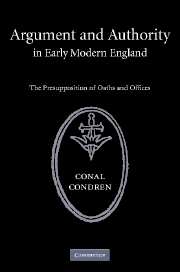Book contents
- Frontmatter
- Contents
- Preface
- Introduction
- Part I The liquid empire of office
- 1 An overview
- 2 Ceremonies of office: The kiss of the tutti-man
- 3 Institutionalised office: a sense of the scavenger
- 4 The vocabulary of office
- 5 Offices of the intellect: player, poet and philosopher
- 6 Soul and conscience
- Part II The authority and insolence of office
- Part III ‘I, A. B.’
- Epilogue
- Bibliography
- Index
4 - The vocabulary of office
from Part I - The liquid empire of office
Published online by Cambridge University Press: 28 October 2009
- Frontmatter
- Contents
- Preface
- Introduction
- Part I The liquid empire of office
- 1 An overview
- 2 Ceremonies of office: The kiss of the tutti-man
- 3 Institutionalised office: a sense of the scavenger
- 4 The vocabulary of office
- 5 Offices of the intellect: player, poet and philosopher
- 6 Soul and conscience
- Part II The authority and insolence of office
- Part III ‘I, A. B.’
- Epilogue
- Bibliography
- Index
Summary
And woe unto the people that is brought into such straights and perplexities.
(George Lawson, Politica sacra et civilis, 1660, 1689, ch. 15.8)The scene set, I shall now turn to the moral vocabulary of office from which disparate doctrines were developed. A concluding section, however, will comment on the king's two bodies, perhaps the best known of such doctrines, prior to a fuller exploration of the discourse of office in the following chapters. By the end of the sixteenth century, there was a clearly related set of covering terms used to abridge understandings of office: vocation, calling, profession, trade, sphere and end. These were not always synonymous, but their use made claim to similar senses of the ethics of office-holding and to the same complementary registers of justification and critique. To begin with what I am taking to be the central word: office was often used as a general term for a world of duties and purposes, carried out by a persona who enjoyed concomitant liberties to those ends. Casually employed, it might indicate only a specific ad hoc favour. Shakespeare, who uses the term office and its cognates some 150 times, employs it thus in Twelfth Night when Viola asks Sir Toby Belch to ‘do me this courteous office’ of saying how she has offended. It sometimes meant a specific field of responsibility and by extension a dedicated function; Walter Charleton surmised that the ‘parenchyma’ had the ‘office of a strainer’.
- Type
- Chapter
- Information
- Argument and Authority in Early Modern EnglandThe Presupposition of Oaths and Offices, pp. 80 - 104Publisher: Cambridge University PressPrint publication year: 2006

